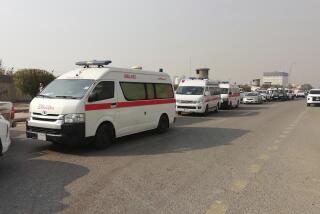Militia battles U.S., Iraqi forces
- Share via
BAGHDAD — Clashes between Shiite Muslim militants and U.S. and Iraqi troops erupted in east Baghdad on Thursday night when groups loyal to anti-U.S. cleric Muqtada Sadr accused Washington of orchestrating the assassination of a popular lawmaker.
An official at Iraq’s Interior Ministry said Sadr’s Mahdi Army militiamen fought with U.S. and Iraqi soldiers in the sprawling Sadr City district after mosques broadcast accusations that coalition forces were behind a bombing hours earlier that killed Shiite lawmaker Saleh Uqaili. Explosions and gunfire could be heard in adjacent neighborhoods.
A resident of Sadr City, who gave his name only as Mohammed, said fighting broke out about 11 p.m. as militants clashed with Iraqi soldiers and, later, U.S. troops who arrived for backup. Heavy fighting lasted about an hour and was followed by intermittent gunfire, he said.
The U.S. military said in a statement that coalition forces “received small-arms fire while conducting routine operations,” injuring one soldier.
Earlier Thursday, a U.S. military statement blamed the assassination on Shiite rivals of Sadr’s movement.
Uqaili, 41, a member of Sadr’s political bloc, which holds 30 seats in parliament, was killed when a bomb exploded as his motorcade was passing a military checkpoint in Sadr City. The attack came amid two weeks of increased violence across Iraq, including ambushes and suicide bombings that have killed dozens.
Iraqi police said a bomb on a motorcycle exploded about 200 yards from the checkpoint at a walled entrance to the neighborhood. Other reports indicated that the bomb may have been fastened to a manhole cover and detonated as the motorcycle and Uqaili’s convoy, which also included other legislators, passed.
The lawmaker was taken to a hospital, where he died of his injuries, according to Sadr officials. One bodyguard and at least one bystander also died.
A university professor with five children, Uqaili was considered a moderate voice in Sadr’s camp. The morning attack in a secured part of the city raised concerns that Shiite factions, including the Badr Organization and groups supported by Iran, may be targeting one another ahead of next year’s elections.
Baha Araji, a lawmaker with Sadr’s bloc, accused the Iraqi military of lapses in security and suggested two reasons that the assassins may have targeted Uqaili’s convoy: as punishment for the Sadr bloc’s opposition to renewing a security agreement extending the U.S. troop presence in the country, and to weaken the bloc’s representation in parliament in the upcoming elections.
“There will be a battle in the elections and this [killing] is indeed a liquidation,” Araji told Al Arabiya TV. “We have warned that the Sadr movement has been targeted, especially in seats where they already hold office.”
But a Sadr spokesman, Ahmed Massoudi, left no doubt that he thought American troops were involved in the assassination of Uqaili. “The occupation forces sent us a message by staging this attack because of our stance against the agreement,” he said.
Iraqi Prime Minister Nouri Maliki issued a statement saying, “We reaffirm our determination to get at the hotbeds of terrorism and crime and [to] arrest and prosecute the killers and bring them to justice.”
Sadr, who is believed to be in Iran, had ordered his Mahdi Army militia to cease activities last year; the decision was a big reason for the overall drop in violence.
Sadr City, one of Baghdad’s poorest neighborhoods, has been the scene of many battles between Sadr forces and U.S. and Iraqi troops. It was targeted in the U.S.-led troop buildup, when additional American forces were sent into Iraq beginning in early 2007, and has been walled off to contain militants.
In other developments Thursday, a bomb exploded near a minibus in Baqubah, about 35 miles northeast of Baghdad, killing a Sunni Arab fighter with the Awakening movement that has worked with U.S. troops against Islamic militants. His wife, daughter and son were also killed.
A bomb detonated near a restaurant in Tall Afar, killing two people, including a police officer.
--
jeffrey.fleishman @latimes.com
--
Times staff writer Raheem Salman and a special correspondent contributed to this report.
--
On latimes.com
And the number is?
Lebanon says Syria has thousands of troops at the border. Syria says it’s only a few hundred. latimes.com/babylon
More to Read
Sign up for Essential California
The most important California stories and recommendations in your inbox every morning.
You may occasionally receive promotional content from the Los Angeles Times.











